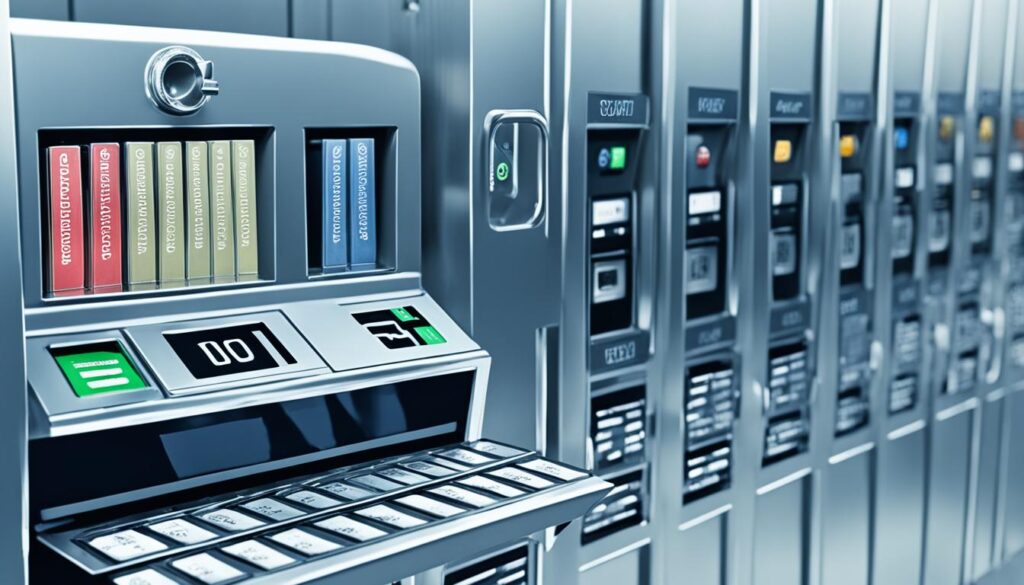Managing a business’s finances well starts with choosing the right bank account. There are many kinds of business bank accounts to fit the various needs of businesses. Owners have several options for their financial management.
Key Takeaways:
- There are several types of business bank accounts available to meet the financial needs of different businesses.
- The types of business bank accounts include business checking accounts, business savings accounts, business certificates of deposits, merchant accounts, business money market accounts, and foreign currency accounts.
- Each type of account has its own advantages and considerations, allowing business owners to choose the one that best suits their financial goals.
- Business checking accounts offer versatile features for managing day-to-day transactions, while business savings accounts provide higher interest rates for saving and accumulating funds.
- Business certificates of deposits offer higher interest rates for a fixed term, merchant accounts are essential for accepting debit and credit card payments, and business money market accounts combine the features of checking and savings accounts.
Business Checking Accounts
Business checking accounts help businesses of all sizes with their money. They make it easier to handle finances well. This includes keeping track of money going in and out. Let’s look at what business checking accounts offer, their good points, and not-so-good points.
Features of Business Checking Accounts
These accounts come with features made for business needs:
- Easy deposit and withdrawal: You can put money in and take it out with no hassle.
- Payment capabilities: Businesses can pay online or by check, keeping their deals smooth.
- Fund transfers: Moving money between accounts is easy, helping with cash flow.
- Debit cards and checkbooks: You get a debit card and checkbook for daily spending.
Pros of Business Checking Accounts
Here are some good things about having a business checking account:
- Low opening deposits: You don’t need a lot of money to start one, helping small and big businesses alike.
- Unlimited access to funds: Take out cash whenever you need to, no limits.
- Convenient payment options: Pay easily with a debit card or checks to anyone your business owes.
- Separation of personal and business finances: It makes keeping your business money and your personal money separate, good for taxes.
Cons of Business Checking Accounts
There are a few downsides to business checking accounts, too:
- No interest-earning potential: Money in these accounts doesn’t grow like it might in a savings account.
- Possible fees: You could face fees for transactions or if you spend more than you have. Always check the fees at the bank first.
But, even with these downsides, business checking accounts are very important. They offer a lot of benefits for managing your business money wisely.
| Pros of Business Checking Accounts | Cons of Business Checking Accounts |
|---|---|
| Low opening deposits | No interest-earning potential |
| Unlimited access to funds | Possible fees |
| Convenient payment options | |
| Separation of personal and business finances |
Business Savings Accounts
Business savings accounts are key for businesses that want to save and earn interest. They come with many useful features. These help businesses reach their financial targets.
Features of Business Savings Accounts
They have several features just for business needs:
- Competitive interest rates make them better than regular business checking accounts.
- With savings goals, businesses can plan for special projects or investments.
- Having a separate account keeps business funds apart from savings and emergencies.
- Most have online banking, which makes managing money easier.
Pros and Cons of Business Savings Accounts
Business savings accounts can be very helpful but consider these points:
“A business savings account is great for saving extra money with interest. It helps businesses be stronger financially and ready for tomorrow.”
| Pros of Business Savings Accounts | Cons of Business Savings Accounts |
|---|---|
|
|
Business savings accounts let businesses save and earn while keeping money handy. Yet, they need a big initial deposit and have limits on accessing funds. This requires smart financial planning.

Business Certificates of Deposits Accounts
Business certificates of deposits (CD) accounts let businesses earn more interest on their spare cash. These accounts are a safe, predictable way for businesses to invest. They enjoy a fixed return on their money.
For business CD accounts, you put a sum of money in for a set time, which we call the term. The money can’t be touched without paying a penalty. Usually, you get a higher interest rate if you choose a longer term.
What makes business CD accounts stand out is the good interest rates they offer. These rates are usually higher than you’d get from other business accounts. This makes CDs a good choice for businesses with extra money to invest.
But, it’s smart to look at both the good and the bad of these accounts before investing:
Pros of Business Certificates of Deposits Accounts
- Higher interest rates than other business accounts
- Promise of fixed returns
- A secure way to invest
Cons of Business Certificates of Deposits Accounts
- You can’t get to your money before it’s matured
- A minimum deposit might be needed
- Early withdrawal might cost extra fees
Choosing a business CD account can be great if you have extra money. It’s also important to check how a CD account fits your business’s financial needs before signing up.
| Feature | Description |
|---|---|
| Higher Interest Rates | Business CDs offer higher interest rates than other bank accounts, allowing businesses to maximize their returns on surplus funds. |
| Fixed Returns | CD accounts provide a guaranteed and predictable return on investment, making them a suitable option for businesses seeking stability. |
| Restricted Access to Funds | Once the funds are deposited in a CD account, they cannot be accessed until the maturity date. Early withdrawals may result in penalty charges. |
| Minimum Deposit Requirement | Some business CD accounts may require a minimum deposit amount to open the account. It is essential to consider this requirement when choosing an institution. |
| Potential Fees | Early withdrawals from CD accounts may incur fees or penalties, reducing the overall return on investment. |
Merchant Accounts
Merchant accounts are vital for businesses taking debit and credit cards. They help companies safely and easily get payments from customers. These accounts then move the money to the business’ bank account promptly. This means there’s no waiting to use the funds.
One big plus of merchant accounts is how they boost sales by letting businesses take card payments. This expands who they can do business with. It also makes things easier for customers who want to pay without cash. Companies can choose from various payment methods to suit their customers.
Yet, there are a few things businesses should know before getting a merchant account. There might be fees to apply and set it up, and these fees change with each provider. Business might also have to pay a small fee for each card sale. Plus, if they ever want to leave the service, there could be a fee for that too.
“Merchant accounts are an essential tool for businesses that want to accept debit and credit card payments. They offer convenience and flexibility to both the business and its customers.”
Pros and Cons of Merchant Accounts:
Pros:
- They help businesses grow by letting them take card payments
- Make shopping easier for customers who prefer not to use cash
- They ensure that transactions are safe and happen quickly
Cons:
- Getting started might involve some costs for a business
- There could be a charge for each card payment
- If a business wants to leave, there could be a fee for that too
Even with these fees, merchant accounts have key benefits. They are great for companies wanting smooth payment handling and to please their customers. Businesses should carefully check out different providers. Compare what they offer and their costs to choose what’s best for their budget.

Business Money Market Accounts (MMAs)
Business money market accounts (MMAs) blend features from both checking and savings. This makes them perfect for firms aiming to broaden their financial options. They offer various benefits, such as:
- MMAs usually have higher interest rates than normal savings accounts. This means businesses can potentially earn more on their reserved funds, increasing their total gains.
- They also allow check-writing, unlike standard savings accounts. This lets businesses easily pay or access their funds when necessary, adding a layer of convenience.
- Additionally, MMAs provide debit cards for ATM cash withdrawals. This quick access to cash offers further convenience.
But, MMAs come with some limitations and things to think about:
- There’s often a required minimum deposit to open an MMA. For companies with scant funds for their banking, this can be a hurdle.
- MMAs might have fees like monthly charges or extra fees for too many transactions. It’s key for businesses to look closely at the fee details before signing up for an MMA.
- They also typically have a cap on the number of transactions allowed. For firms that do a lot of business, this limit can feel constraining.
Even with these points in mind, MMAs’ flexibility and competitive interest rates can make them a promising option. They mix accessibility and potential earning well for many businesses.
Real-World Example
“As a small business owner, I found that opening a business money market account provided me with a convenient way to manage my cash reserves effectively. With the check-writing capabilities and interest-earning potential, I could access my funds when needed and still earn a competitive return. While there were some fees involved, the overall benefits outweighed the costs for my business.” – Jane Smith, Owner of ABC Consulting
| Pros | Cons |
|---|---|
| Higher interest rates compared to traditional savings accounts | Minimum deposit requirements |
| Check-writing capabilities for convenient payments | Fees, such as maintenance fees or excessive transaction fees |
| Debit cards for easy access to cash | Limited number of transactions allowed |
Foreign Currency Accounts
Foreign currency accounts are great for businesses working across borders. They let you move money in different currencies, making payments easier and reducing costs. With some, you can even earn interest in foreign currencies, boosting your returns.
Yet, there are things to think about. Foreign currency accounts help with global transactions and protect against currency changes. But, they need a big first payment. Plus, there are costs for converting money and managing your account.
In short, these accounts make working with various currencies easier. They also offer a chance to earn extra in foreign money. But, be ready for big starting payments and extra charges. Always think about what your business really needs before you get one.

Setting Up a Business Bank Account
Setting up a business bank account is more than just paperwork. It demands your full attention and careful choice. You need to select the best account for your business to manage your finances well. This means looking at various options and getting all your documents ready.
Research Bank Account Options
First, look into the different bank accounts out there for businesses. Think about what each offers, like fees and benefits. This way, you can choose the perfect account, whether it’s for checking, saving, or something else.
Choosing the Right Bank Account
Choosing the right bank account is vital. You should think about your business’s needs and future goals. Pay attention to things like fees, balances, and how easy it is to use the account. Also, consider how well it fits with other systems you use, like for payments or bookkeeping.
By picking the right account with care, you make sure your business’s money is in good hands.
Gathering Required Documentation
To open a business bank account, you need certain paperwork. The exact documents can change based on your location and the bank’s rules. But, you’ll usually need proof of ID, your business’s registration papers, and tax ID numbers.
Make sure you have everything organized before you head to the bank. This step will make the account opening process go a lot smoother.
In the end, setting up your business bank account requires serious thought and planning. Be sure to look at all your options, choose wisely, and get all your documents in order. This way, you set your business up for better financial management.
How to Open a Business Bank Account
Opening a business bank account is key for finance management. To make this process smooth, follow these steps:
- Decide on the Account Type: First, pick the right account type for your business. You might need a checking account for daily use or a savings account for extra money.
- Research Bank Account Options: Next, look at what different banks offer. Check out the features, benefits, and fees. This will help you find the best account for your business.
- Have Conversations with Top Choices: Talk to the banks that seem like a good fit. Speaking with their representatives will clear up details and help you choose well.
- Choose a Banking Institution: After doing your homework and talking with the banks, pick one. Consider their reputation, how they treat customers, and any extra services they offer.
- Gather Required Documentation: Before you go to the bank, gather the documents you’ll need. This will likely include ID, business registration, and tax info.
- Submitting Documents and Opening the Account: Then, go to the bank and give them your paperwork. They’ll help you with the rest, like signing any needed forms.
Account Opening Checklist
When you’re ready to open your business bank account, here’s what you’ll need:
| Document | Reason |
|---|---|
| Business registration documents | To verify the legal existence of your business |
| Identification documents (e.g., passport, driver’s license) | To establish your identity and relationship to the business |
| Tax identification number (e.g., EIN, TIN) | For tax purposes and to comply with regulatory requirements |
| Proof of address (e.g., utility bill, lease agreement) | To confirm the business’s physical location |
| Business plan | To provide an overview of your business and its financial projections |
| Financial statements | To demonstrate the financial stability of your business |
Following these steps will put you on track to get the right business account. With the right account, you can keep your finances in order and build a strong financial future for your business.

How to Choose the Right Bank Account for Your Business
Picking the right bank account for your business is a big decision. It can greatly affect your business’s financial success. Here are some important things to think about:
Fees
Make sure you know all the fees for a bank account before you open one. This includes monthly fees and any extra costs for services. Be sure to look at fees from different banks to find the most affordable option.
Minimum Balance Requirement
Some accounts ask you to keep a certain amount of money in them. Think about your business’s cash flow and if you can meet this requirement. It should match what your business needs and aims to do.
Transaction Limits
Each account might have rules on how many transactions or how much money can be moved. Look at how many transactions your business usually needs to do. Be sure the account’s limits fit what you need.
Interest Rates
Interest rates on accounts can vary a lot. If getting interest on your business’s money is key, compare rates from different banks. A higher interest rate account could earn more money for your business over time.
Ease of Setup and Use
It’s important that your bank account is easy to set up and use. Look for options with good online and mobile banking. Also, see if they offer tools or software that work well with your business.
Integration with Existing Business Infrastructure
If you use certain financial tools, choose a bank that works well with them. Make sure the bank’s services can easily connect with your other business tools. This makes everything run more smoothly without extra work.
Taking time to think about these points will help you pick the best bank account for your business. Remember to look at what your business really needs. If you’re not sure, getting advice from a professional can guide you to make the right choice. A good bank account can help your business succeed financially over the long run.
Conclusion
There are many types of business bank accounts to choose from. Each meets different financial needs. When picking an account, business owners should look at what their company needs. This could be a checking account, savings account, or even a foreign currency account. The right choice helps keep finances in order.
Checking accounts are good for day-to-day money use. Savings accounts let a business make some extra money with interest. If a company doesn’t need to touch their money all the time, a certificate of deposit might be right. These offer better interest but you can’t get to the money easily.
For those taking card payments, a merchant account is key. It lets businesses take debit and credit cards. To earn more interest on their money, companies could choose a money market account. But, these have fewer transactions you can make. And for those working globally, there are accounts in foreign currencies.
To sum up, the best bank account choice depends on what a business needs. This includes how they use the money and if they do business worldwide. It’s crucial for owners to review their options carefully. This way, they can pick an account that helps their business goals. Choosing wisely will keep financial processes running smoothly and support business growth.
FAQ
What are the types of business bank accounts?
There are several types of business bank accounts:
- Checking accounts
- Savings accounts
- Certificates of deposits (CD)
- Merchant accounts
- Money market accounts
- Foreign currency accounts
What are business checking accounts?
Business checking accounts let business owners manage their money. They can deposit, withdraw, pay bills, and move funds. These accounts also come with a debit card and checkbook for easy use.
What are business savings accounts?
Business savings accounts help businesses save money. They earn interest on these savings. The accounts offer good interest rates and are perfect for emergency funds or future plans.
What are business certificates of deposits accounts?
Business CD accounts earn higher interest. But, the money is stuck for a set time. If you take it out early, you’ll pay a penalty.
What are merchant accounts?
If a business takes credit or debit cards, they need a merchant account. It holds customer payments and then moves the money to the business’s regular bank account.
What are business money market accounts (MMAs)?
MMAs mix the benefits of checking and savings. They earn more interest, allow checks, and have debit cards for ATM use.
What are foreign currency accounts?
These accounts are for doing business in other countries. They let businesses send and get money in foreign currencies. They might even earn interest.
How do I set up a business bank account?
To begin, explore your bank account options. Think about the account’s features and fees. You’ll also need various documents like ID, business registration, and tax numbers.
How do I open a business bank account?
First, pick the type of account you need. Then, look at your options and talk to banks. Choose a bank, gather your documents, and submit them to open the account.
How do I choose the right bank account for my business?
When picking a bank account, look at the fees and rules. Consider interest rates and how easy it is to use. Also, think about how it fits with your business.


















